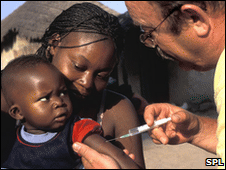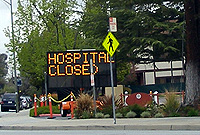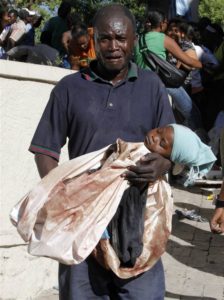 By SCOTT FARWELL / The Dallas Morning News
By SCOTT FARWELL / The Dallas Morning News
sfarwell@dallasnews.com
PORT-AU-PRINCE, Haiti – Minutes after the earthquake, mangled bodies began appearing in the courtyard of Hospital of the Sacred Heart.
Dr. Reynold Savain becomes emotional while discussing the failure of Centre Hospitalier du Sacre’-Coeur/CDTI, the hospital that he and his family owned.
Dr. Reynold Savain remembers stepping over the dead and dying that first night, careful not to slip on the blood and body fluids. He remembers the chaos, the plaintive cries for help, the pile of broken and crushed corpses.
There is no other word to describe it, he said, but “nightmare.”
Centre Hospitalier du Sacre’-Coeur/CDTI, a private medical facility owned by Savain and his family, was the most advanced hospital in Haiti. Days after the quake, foreign doctors and nurses transformed it into one of the city’s most bustling intensive care units.
Today, it is closed. Bankrupt. Silent.
CDTI’s troubles illustrate a great paradox in Haiti.
Thanks to volunteer doctors from abroad and donated medical supplies, health care here has never been better.
But local doctors and private hospitals are dying. CDTI may seem like an improbable casualty of a natural disaster typically described as a medical crisis – an estimated 230,000 people dead and a half-million more injured.
But five months after a 7.0 quake reduced much of the city to rubble, CDTI’s sophisticated equipment – a CT scanner and a suite of digital X-ray machines – sits idle in the country’s most modern operating rooms.
Boxes of donated medical supplies clog hallways, where in the macabre days after the quake, doctors with scalpels and saws performed dozens of guillotine amputations.
“I gave everything,” Savain said. “I turned the hospital over to the Americans and some of these big NGOs [nongovernmental organizations such as the American Red Cross] because they said they had money and they would help me.
“But nobody gave me a dime.”
After three months without paying his 177 employees, Savain, by Haitian law, had to make a decision: either pay up or fire them. He closed the doors March 31.
“All the NGOs were willing to give was rotational doctors,” Savain said. “But I told them I needed to repair the building, we had used all our supplies, and we had to pay the staff. The only way to do that is with money.”
CDTI was once a source of national pride, a modern, Western-style medical center designed by Haitian architects, built by local engineers and financed by wealthy entrepreneurs. Last year, it was the site of the country’s first organ transplant.
The procedure, Savain and others said, sent a clear message to the nation’s wealthy: “You no longer have to travel to Miami or the Dominican Republic for modern medical care. You can go to CDTI.”
Then, on Jan. 12, the earth shifted under Port-au-Prince.
Six months later, local doctors and private hospitals say they still feel the aftershocks.
“Free care is perfect. You can imagine more and better things now,” said Dr. Michel Theard, a Haitian cardiologist who sits on the board of the Canape-Vert hospital.
But the struggling 30-bed private facility now serves only six or seven patients, and the staff has been slashed in half.
“Local doctors gave away free care at the beginning, like everyone else,” Theard said. “But they have to survive. They have their own families and their own responsibilities.”
Canape-Vert, he said, is hanging on because it is a 50-year-old hospital without the debt of the more modern, 3-year-old CDTI.
“CDTI was the best hospital in Haiti, but it was not making as much money,” Theard said. “It had no financial reserves. It was so young. If you make a mistake – or something happens like an earthquake – you die.”
Haitian doctors agree that the prospects for patients have never been better.
But what happens when the money dries up and foreign doctors leave? The medical system could be worse than ever.
Theard said the answer is obvious. International aid should be used to keep the local health care system alive. Hire local physicians, he said, and subsidize private hospitals.
“In the first days, the NGOs came from all over, like bulldozers,” Theard said. “And they gave free care for surgery, for deliveries of pregnant women, for consultations, without ever going to the locals and asking, ‘Can we do some of this together?’ ”
Before the earthquake, most health care in Haiti was theoretically free. But doctors say the system was crippled by lack of supplies, poor management and widespread corruption.
“You might have surgery scheduled, and it is postponed one day because there is no oxygen, the next day because there are no cleaning supplies,” said Brigitte Hudicourt, an ophthalmologist who now works part time for Doctors Without Borders. “You might spend a month in the hospital and spend more money waiting and waiting than if you went to a private hospital.”
As a result, some Haitians sought care at church-sponsored institutions such as Adventist Hospital in Leogane or other clinics. Many just went untreated.
Cristian Morales, a spokesman for the World Health Organization, said Haiti’s private health care system and exclusive hospitals like CDTI have simply not been a priority for relief organizations in the first six months after the earthquake.
He said fewer than 5 percent of people – the wealthy and well-connected – could afford to visit private hospitals and physicians.
“The earthquake put CDTI out of business because of the general lack of resources in the country,” he said. “For the first times in their lives, many Haitians have access to health care.
“People have lost their homes and their source of income, and they’re just not in a position to contribute to the private system.”
Savain called that philosophy shortsighted – the international medical relief will one day pull out of Haiti – and hypocritical.
“Before the earthquake, when anybody at WHO got sick, guess where they went to the hospital?” he said. “They were glad CDTI was in business.”
No financial support
Dr. Craig Hobar, a Dallas plastic surgeon, and a medical team from his nonprofit LEAP Foundation arrived at CDTI the fourth day after the earthquake. He, too, remembers the heroism of Haitian doctors.
“I know there were a lot of supplies coming into that hospital, but there was no financial support,” Hobar said. “We always thought that some of the massive money donated to Haiti would end up going to that hospital.
“But as far as I know, [Savain] never got a dime and he just kept it open.”
Records from USAID, the international relief arm of the U.S. government, show that a representative from CDTI applied for aid from the U.S. Foreign Disaster Assistance field staff in February, but withdrew the request in May – two months after the hospital closed.
Savain said he suspended his $1.5 million request because his business was belly-up and he had been told his application was denied. He hopes to sell the facility to the Haitian government or a U.S. nonprofit group.
“That hospital was built on a poor but stable Haitian economy that doesn’t exist anymore,” Hobar said. “I don’t think this is the time to be a private hospital trying to make money, but a hybrid or some sort of subsidized hospital would allow people to provide care and be reimbursed a fair value for it.”
Judith Timyan, USAID’s health team coordinator, said the Haitian minister of health is developing a sliding-scale national insurance system based on patient income. That way, patients receive care and doctors get paid.
“We’re supporting the government of Haiti to make sure Haitian doctors and nurses get back to their jobs and earning salaries,” she said.
“That will ensure the health care system is ongoing, sustainable and operating 18 months from now and 10 years from now.”

It is a very tricky balancing act.
For generations the elite has had a free ticket for everything good in Haiti. This includes health care. They had their doctors in Haiti and – if this was not enough – they had air fare and visas that allowed flights elsewhere for specialized treatment.
On the other hand, Haiti’s vast …very poor majority has had absolutely no health care and no visas to escape a problem.
Now the earthquake has given a small proportion of this vast majority a window on some basic health care and the elite are screaming bloody murder.
They would rather see these volunteer medical people barred from the country so that they can continue upon their course.
I must admit that one of the basic problems can be seen in the fact that these volunteers tend to cluster around areas of convenience, with good transport, access to civilization…etc. Few really penetrate the countryside where the desperation is, and always has been overwhelming.
There must be some sort of balance that can be found.
We cannot see the Haitian medical element destroyed.
We cannot stop the flow of volunteer help to those who have no hope.
I, for one, do not have one of those easy “Monday Morning” solutions to the challenge.
Perhaps you do.
Collins
CDTI was not the sort of place my houseboy, or his family from the provinces, would be welcomed in….other than to scrub floors, empty bedpans, or carry patients.
You needed money, or health insurance to get past reception.
So let us not mix oranges with lemons.
Haiti must preserve its existing hospitals.
But we must also function on the wide scale to get some help to the millions without any sort of medical assistance, other than some Voodoo priest with spells and potions. (Some of these seem to work)
We need security, jobs, schools and medical facilities.
We do not need Preval and his band of vagabonds.
We need a new Electoral Council (CEP)…elections and a new governement to cooperate and coordinate construction of Haiti with foreign donors.
Dear mister collins
For many years the USA and Canada had it all free over the taxe of te poor haitians. For more than fourty years My country has produce more than a 100 medical doctors at no cost for the students and they have been brain drained to the USA and Canada. They have care for americn during the vietnam war and have kept on staffing your health system since. In the mean time 70 % of the haitian population had no access to health care and were lead to think it was its falt.
We have produce up to 200 doctors a year in the 70’s to see all of them go to the USA and Canada within a year of their graduation.
The ones that came back or did not leave were NEVER servant of the elite only. You should inform yourself before having this type of statement.
Most of us that were strong enough to work with no support had to suffer our pateints passing away because of no insuline during the embargo sign by you country or losing our menbership to any international group because there credit card were not functionel. We were again THE ONLY ONE PRESENT TO GIVE CARE for the first 3 days after the quake using everything in any structure that was still standing. Yet many of us sometim doing this after having pulled our own parents out of the rubbles (were they alive?).
We again had to bare the accusation of many arriving days after accusing us of not working and not knowing how many hours we had slept in the last three days.
yes I am part of the elite , yes I am a doctor .
We are often to proud and to humble tell what we do. We have no culture of going on the radio and the net tell people that we are saviors. We just save.